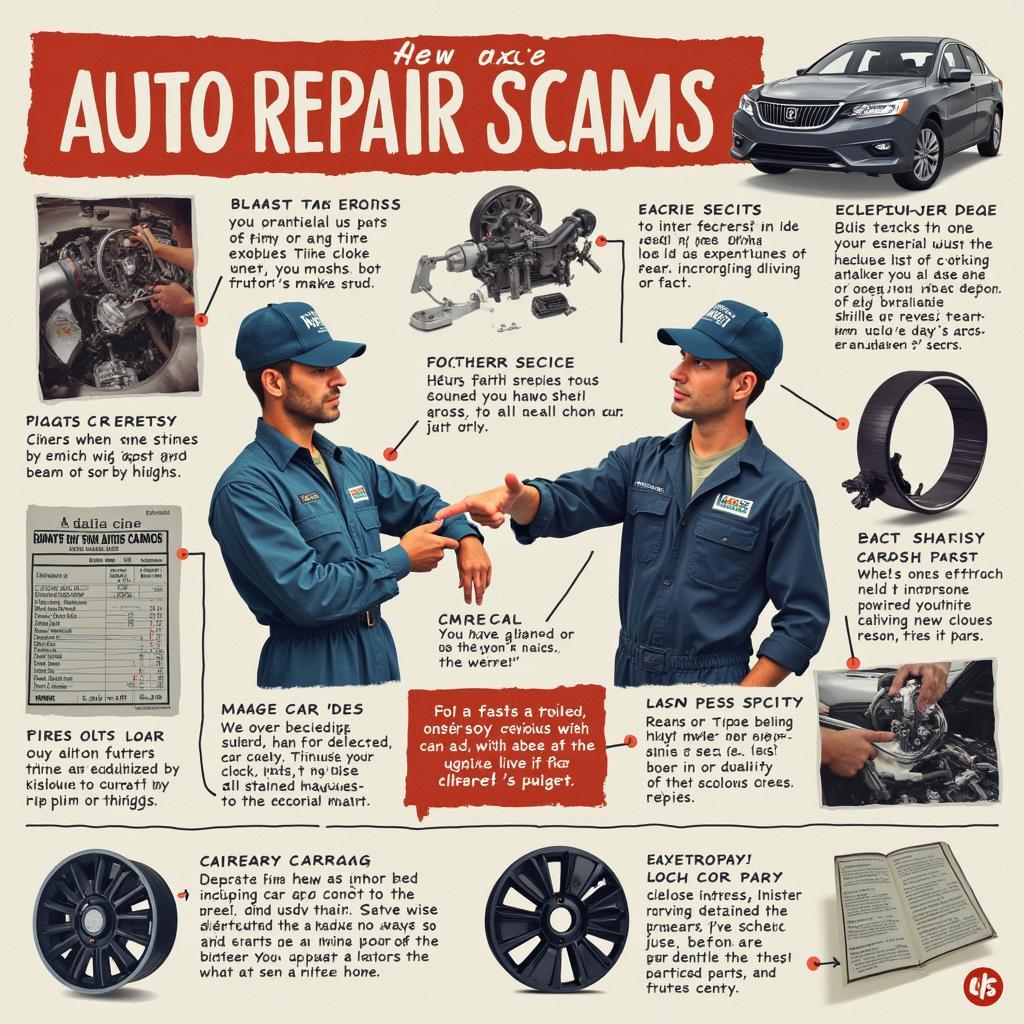Imagine this: your car starts making a strange noise, and your check engine light flickers ominously. You take it to an auto service department, your heart sinking as you anticipate a hefty bill. While most auto service providers are honest and reliable, unfortunately, some resort to shady tactics to inflate prices and exploit unsuspecting customers. This article will equip you with the knowledge to identify and avoid common Auto Service Department Scams, ensuring you receive fair and ethical treatment.
 Common Auto Repair Scams
Common Auto Repair Scams
Understanding the Landscape of Auto Service Scams
Auto service scams can take various forms, from recommending unnecessary repairs to using low-quality parts while charging premium prices. These unscrupulous practices prey on customers’ lack of automotive knowledge, leaving them feeling cheated and vulnerable. Recognizing the potential for deceit is the first step towards protecting yourself.
Common Auto Service Department Scams
Here are some prevalent scams to watch out for:
- The “Recommended Service” Scam: This tactic involves convincing you to perform unnecessary maintenance or repairs, often by exaggerating the severity of minor issues.
- The “Scare Tactic” Scam: Mechanics might use fear to pressure you into costly repairs by exaggerating the safety risks associated with minor problems.
- The “Parts Swap” Scam: This scam involves replacing your good parts with old or low-quality ones while charging you for brand new components.
- The “Phantom Repairs” Scam: This deceptive practice involves charging you for repairs that were never actually performed.
Protecting Yourself from Auto Service Scams
Knowledge is your best defense. Here’s how you can safeguard yourself:
- Get a Second Opinion: If a mechanic recommends a major repair, always seek a second opinion from another trusted mechanic.
- Ask for Written Estimates: Always request a detailed written estimate before authorizing any repairs. This protects you from hidden charges and ensures transparency.
- Understand Your Vehicle’s Maintenance Schedule: Familiarize yourself with your car’s recommended maintenance schedule in the owner’s manual. This helps you determine which services are genuinely necessary.
- Be Present During Inspections: If possible, observe the mechanic during the inspection. This allows you to ask questions and get a firsthand look at the condition of your vehicle.
 Car Maintenance Checklist
Car Maintenance Checklist
Red Flags to Watch Out for
Be wary of these warning signs:
- High-Pressure Sales Tactics: Be cautious of mechanics who use aggressive sales tactics or pressure you into making immediate decisions.
- Vague Explanations: If a mechanic can’t or won’t provide clear explanations about the recommended repairs, it could be a red flag.
- Lack of Transparency: Beware of shops that are reluctant to show you the condition of your vehicle or the parts being replaced.
- Significant Price Discrepancies: If the final bill is significantly higher than the initial estimate, demand a detailed breakdown of the charges.
What to Do If You Suspect a Scam
If you believe you’ve been a victim of an auto service scam, take the following steps:
- Document Everything: Keep all receipts, invoices, and any communication with the auto service department.
- File a Complaint: Contact your local consumer protection agency or the Better Business Bureau to file a complaint.
- Seek Legal Advice: If the scam resulted in significant financial loss, consider seeking legal advice from a qualified attorney.
 Customer Filing Complaint
Customer Filing Complaint
Conclusion
While encountering an auto service scam can be frustrating and costly, being informed and proactive can significantly reduce your risk. By understanding common scams, recognizing red flags, and taking preventative measures, you can navigate the world of auto repair with confidence and ensure you receive fair and honest service. Remember, knowledge is your best defense against unscrupulous practices.

Leave a Reply